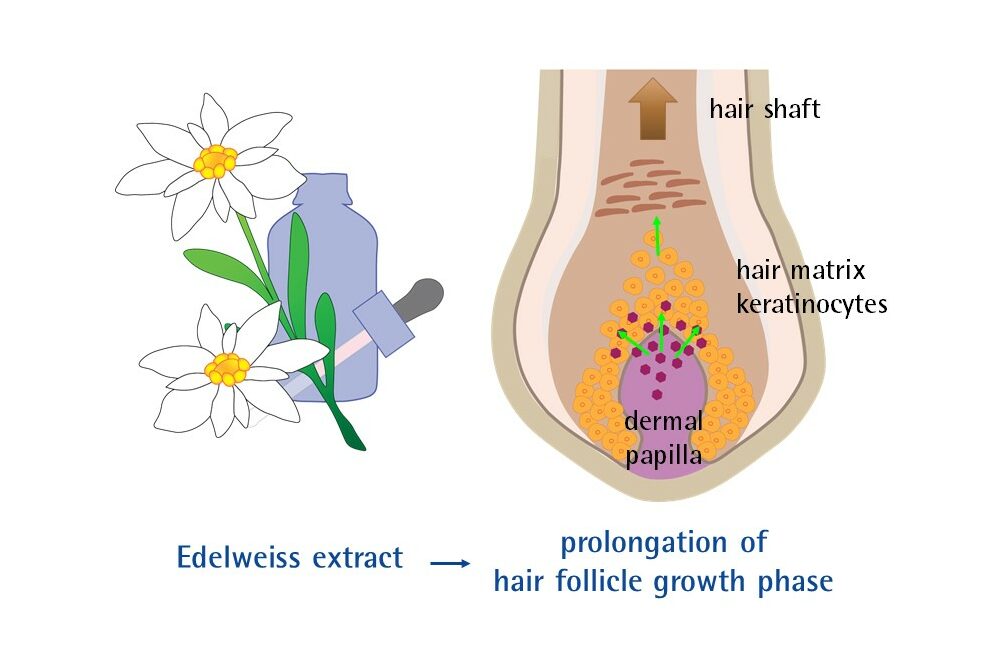In close collaboration with DSM , we showed that an extract of the alpine plant Leontopodium alpinum, or Edelweiss, inhibits hair loss in humans by prolonging the hair follicle growth phase, called anagen, during which the hair shaft, the visible part of the hair, is produced.
Our findings, published in the International Journal of Cosmetic Sciences, are the first to demonstrate that natural Edelweiss ingredients beneficially impact on hair growth and thus may have the potential to serve as adjuvant strategy to treat hair loss resulting from hair follicle disorders or aging.
The production and loss of hair is linked to the hair follicle cycle, a tightly regulated process that requires cooperation between the different hair follicle cell types, especially hair matrix keratinocytes and dermal papilla fibroblasts. Hair matrix keratinocytes are found at the base of the hair follicle. While the hair is growing they proliferate, multiply, and transform into specialized cells forming the hair shaft. However, proliferation of hair matrix keratinocytes is maintained in the presence of specific signals. These signals are released by dermal papilla fibroblasts, a cell type located in close vicinity to hair matrix keratinocytes. As soon as the signals reach the hair matrix keratinocytes, hair shaft production and thus hair growth is induced.
To investigate the effect of the Edelweiss extract on hair follicle function and hair growth, we utilized our well-established human hair follicle organ culture model. For this, we dissected single hair follicles from scalp skin biopsies obtained from plastic surgeries. Afterwards, the hair follicles were cultured in special medium containing all necessary ingredients to maintain their functionality for several days (read more here; Edelkamp et al. 2020).
We compared two groups of hair follicles, one group treated with Edelweiss extract, and one group treated with the solvent containing no active ingredients. After six days, we analyzed different parameters that are associated with hair cycle. Interestingly, treatment with Edelweiss extract markedly prolong the hair follicle growth phase. We tried to explain this effect by analyzing the number of proliferating hair matrix keratinocytes and found increased proliferation in the presence of Edelweiss extract. Since hair matrix keratinocytes need signals from dermal papilla fibroblasts to start proliferating, we had a look at the dermal papilla inductivity, and indeed, dermal papilla inductivity was increased in the presence of Edelweiss extract.
Intrigued by these experimental results, DSM sponsored a small clinical study to analyze whether our findings could be translated into humans. Study participants used a leave- on serum, containing Edelweiss extract, for 5 months’ daily. At the beginning and end of the study, hair density and hair cycle stages were analyzed. Interestingly, the topical application of Edelweiss extract containing serum resulted into fuller hair accompanied by more hair follicles residing in the growth (anagen) phase of the hair cycle.
Taken together, our findings demonstrate that application of Edelweiss extract can stimulate hair growth in humans and that it can possibly be used by individuals looking for fuller hair, and as adjuvant strategy or mild, natural alternative for the treatment of hair loss disorders and prevention of aging.
Keywords: Edelweiss, hair growth, anti-hair loss, hair follicle
#antihairloss #hairgrowth #naturalcosmetics
Read the full story here: An extract of Leontopodium alpinum inhibits catagen development ex vivo and increases hair density in vivo
Campiche et al. “An extract of Leontopodium alpinum inhibits catagen development ex vivo and increases hair density in vivo” Int J Cosmet Sci (2022)


